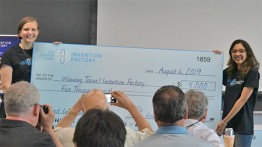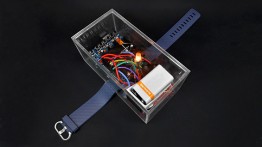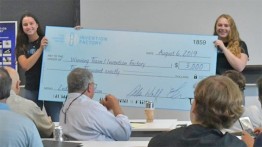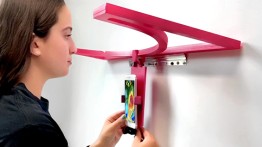Women Take the Lead as Invention Factory 2019 Wraps Up
POSTED ON: August 8, 2019
Invention Factory 2019—the six-week program that teaches students to research, design, and potentially patent an invention—wrapped up on Tuesday with a decidedly distaff bent: the prize winners—four students who worked on inventions for the medical field—were all women.
First prize went to Jeannette Circe ME’22 and Sanjna Rao ChE’22 creators of a wearable device that keeps a diary of brain activity for people with epilepsy. Fitted with biomedical sensors and a microphone, the device, which is worn on the wrist, wirelessly connects information to an app on the patient’s cellphone. It constantly records a person’s vital signs in order to predict the onset of a seizure, as well as the seizure's duration and type. A caregiver is notified when each episode is detected and an emergency notification is sent if the seizure lasts longer than 5 minutes. In addition, it records a few minutes of audio that precedes the seizure, so the user can later review the audio to answer a few targeted questions, previously selected by a doctor, that will aid in the search for triggers that may be avoided in the future.
The competition’s panel of expert judges awarded second prize to Caitlin Reina ME’22 and Gianna Slusher ME’22, the inventors of an at-home system for early breast cancer screening to be used in addition to regular doctor visits. The device employs an off-the-shelf thermal camera that is sensitive to tumors and their blood supply, which, unlike cysts, are warmer than surrounding breast tissue. The camera, which attaches to a woman’s cellphone, takes a set of thermal images from five different angles. An accompanying app allows a woman to play back the images as an animation that highlights the temperature evolution of potential tumors.
Invention Factory was founded at The Cooper Union by professors Alan Wolf and Eric Lima. Besides training undergraduates in the basics of invention, the program is designed to teach students excellent communication and presentation skills. It has proven to be so successful—despite the long hours and commitment needed to get through the rigorous program—that the two professors have brought it to other schools. This past summer, they worked with students at the Indian Institute of Technology (IIT) in Gandhinagar, India for that school’s second consecutive year of Invention Factory. This year’s winners at Gandhinagar devised a system for solar panels to track the sun’s movement, letting them absorb more energy than static panels. Dependent upon hand cranking instead of electricity, the system makes solar power far less expensive.
Professors Lima and Wolf have been invited to IIT Mumbai to conduct the program there next year as well as continuing Invention Factory in Gandhinagar.








